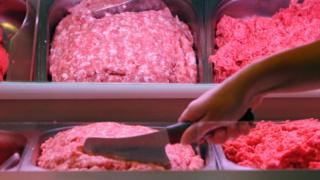More than a fifth of meat sample tests in 2017 found DNA from animals not on the labelling, the BBC has learned.
Out of 665 results from England, Wales and Northern Ireland collected by the Food Standards Agency, 145 were partly or wholly made up of unspecified meat.
The FSA said the levels were consistent with “deliberate inclusion” – but added testing had targeted those businesses suspected of “compliance issues”.
The samples came from 487 businesses, including restaurants and supermarkets.
A BBC Freedom of Information request to the FSA revealed that in total 73 of the contaminated samples came from retailers – including three supermarkets. A further 50 came from restaurants, while 22 originated from manufacturing or food processing plants.
It also showed:
- Some samples contained DNA from as many as four different animals, while others contained no trace of the meat that appeared on the product’s label
- Meat labelled as lamb was most likely to contain traces of other animals’ DNA, followed by beef and goat
- Cow DNA was the most commonly-found contaminant, followed by pig, chicken, sheep and turkey
- The most commonly mis-labelled product was mince meat, while sausages, kebabs and restaurant curries also featured prominently
- Other products in the dataset include ready meals such as spaghetti Bolognese and curries, pizzas and a portion of ostrich meat, which contained only beef
An FSA spokesman said it was up to the relevant local authorities – which procured the samples before sending the results to the FSA – to lead individual investigations and take “appropriate action” such as prosecutions.
He added the results were “not representative of the wider food industry”.
However, a clear picture of the wider food industry is not readily available as less than half of local authorities actually submitted meat sampling data to the United Kingdom’s Food Surveillance System – part of the FSA – in 2017.
Some councils may have focused their food testing priorities “in areas other than meat substitution”, the FSA said – adding that others may have carried out tests later in the financial year.
‘Lack of transparency’
Experts say replacing expensive meat with a cheaper product is a common reason behind food fraud – a global problem that has existed for centuries.
This latest data comes five years after the horsemeat scandal, when processed beef products sold by a number of UK supermarket chains were found to contain significant amounts of horse DNA.
While none of the 2017 samples contained horsemeat, the lack of transparency surrounding the quality and origin of meat products in the UK has raised concerns.
Compassion in World Farming, which campaigns for better animal welfare in the meat industry, said untraceable ingredients made it hard for animal welfare to be “part of consumers’ shopping decisions”.
Responding to the examples of pork hidden in meat sold as lamb, kosher agency the Kashrut Division London Beth Din (KLBD) said there was “a lack of transparency” in some parts of the food industry.
The KLBD added, however, that there were “robust protocols in place to avoid mislabelling” in products labelled as kosher.
How were the tests conducted?
Local authorities gathered samples from businesses in their area before sending them to laboratories for analysis. The results were then submitted to the FSA.
The FSA explained the “majority” of samples were tested for cow, pig, sheep, goat, horse, chicken and turkey DNA because those animals represent the “overwhelming majority” of livestock reared, slaughtered and imported in the UK.
DNA from other animals could have been present in some samples, but may not have been identified as testers were not looking for it.
According to the FSA, the inclusion of DNA at a proportion of 1% or greater should be considered consistent with “deliberate inclusion”.
Samples contaminated by un-named DNA at a level of less than 1% were excluded from the results on the basis they could have been caused by poor hygiene.-BBC






